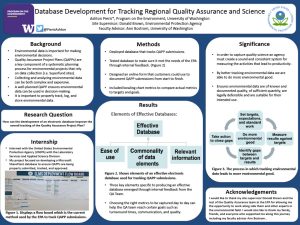Database Development For Tracking Regional Quality Assurance And Science
Government agencies and other organizations increasingly use scientific data to make important environmental decisions. In order to capture quality data an agency must have a sound and consistent system to track, store, and log the data that is collected. One way to accomplish this is through the development of an electronic database that serves these functions. The purpose of this study was to see how tracking environmental data ultimately leads to better environmental projects and decision-making throughout the Environmental Protection Agency’s (EPA) Region 10 program offices- land, air, and water in hopes of maintaining quality and confidence. To accomplish this task my main responsibility was to deploy an electronic database to track Quality Assurance Project Plan (QAPP) submissions using an existing Access Database. QAPPs are one way in which the EPA maintains a robust quality system to provide the needed management and technical practices to assure that the environmental data used to support Agency decisions are of upmost quality. My findings showed that to produce a fully functioning database that captures the essence of quality science it must contain three elements: ease of use, capture useful information, and maintain common data elements across different environmental programs. By maintaining a desired level of quality that can be captured through electronic databases agencies are able to set targets, meet expectations, and set standards that lead to better decision-making and overall environmental good.
